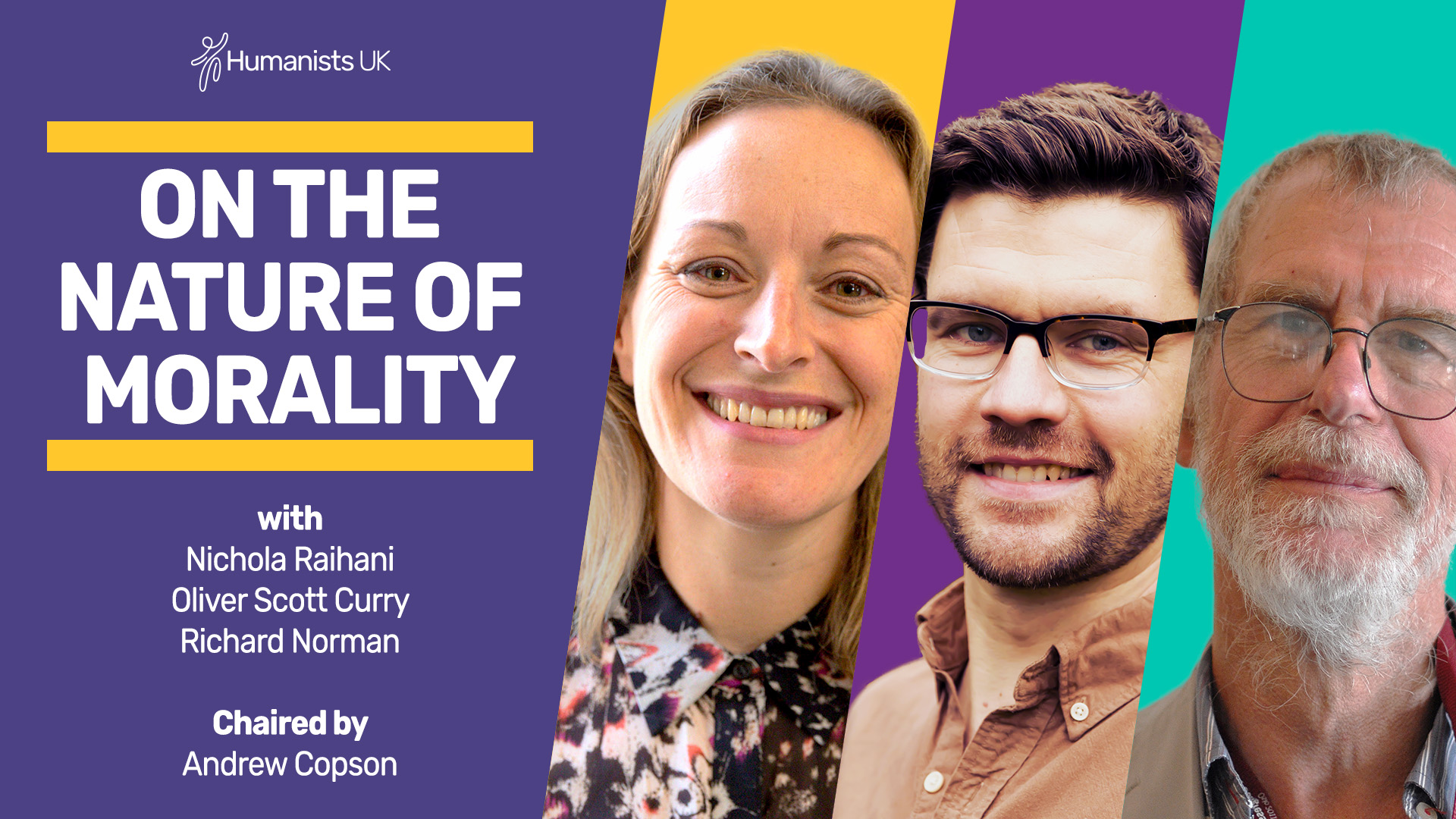On the nature of morality

|
Join Darwin Day Lecturer Dr Oliver Scott Curry, Voltaire Lecturer Professor Nichola Raihani, and Humanist Philosophers Group founder Professor Richard Norman for a very special event On the nature of morality, chaired by Humanists UK Chief Executive Andrew Copson.
Whether directly or obliquely, the foundation and nature of morality have been a source of ceaseless debate by philosophers, scientists, and the general public for millenia – and to this day.
Is it wrong to kill? Is it wrong to steal? Is violence ever the answer? To each of the answers, and to myriad others, we can ask a follow-up: why?
In recent decades, science has increasingly taken an interest in questions of ethics and morality, seeking to understand if there is one universal human morality – or at least one universal basis to understand it. Some have used techniques first deployed more than 100 years ago to argue that while people from different cultures may vary from one another, on average, on precisely which aspects of ‘morality’ they hold to be most important, humans are found to consistently vary along the same six moral ‘dimensions’.
But even if we can measure an individual’s – or a society’s – approach to morality, does that tell us anything about morality itself? If societies differ in their overall understanding of morality, does that make one ‘more’ moral than the other? If ‘moral values’ are simply the most evolutionary advantageous ways of behaving in an increasingly global neighbourhood, could a different set of moral frameworks have evolved – and would that change what it means to ‘do the right thing’?
|
Join us for this expansive discussion of some of the questions most fundamental to what it means to be human.
About Dr Oliver Scott Curry
Oliver’s academic research investigates the nature, content and structure of human morality, and encompasses all of the questions above. To reach the answers, he employs a range of techniques from philosophy, experimental and social psychology, and comparative anthropology. His work argues that morality is best understood as a collection of biological and cultural solutions to the problems of cooperation and conflict recurrent in human social life.
In addition to his research, Oliver has taught courses on evolution and human behaviour, covering evolutionary theory, animal behaviour, evolutionary psychology, cross-cultural psychology, statistics, and research methods.
Dr Oliver Scott Curry is Research Director for Kindlab, at kindness.org. He is also a Research Affiliate at the School of Anthropology and Museum Ethnography, University of Oxford, and a Research Associate at the Centre for Philosophy of Natural and Social Science, at the London School of Economics. He received his PhD from LSE in 2005.
About Professor Nichola Raihani
Nichola Raihani is a Royal Society University Research Fellow and Professor in Evolution and Behaviour at University College London (UCL). Her group's research focuses on the evolution of social behaviour in humans and non-human species.
She has been widely published in scientific journals, won the 2018 Philip Leverhulme Prize in Psychology for her research achievements, and was elected Fellow of the Royal Society of Biology in 2018. She is also the author of The Social Instinct: How Cooperation Shaped the World (Penguin, UK, 2021) and has appeared on several podcasts and radio shows, including BBC Radio 4’s Hacking the Unconscious and Thought Cages, and RSA's Bridges to the Future. You can find out more about Nichola's research and connect with her on Twitter: @nicholaraihani.
About Professor Richard Norman
Richard Norman taught philosophy at the University of Kent for many years, working mainly in the areas of moral and political philosophy, including both theoretical and practical ethics, and is now Emeritus Professor of Moral Philosophy. His books include: The Moral Philosophers; Free and Equal; Ethics, Killing, and War; and On Humanism.
He is an active member of Kent Humanists and was a founder-member of the Humanist Philosophers' Group in 1999, as well as of the Humanist Peace Forum, Humanists for a Better World, and Humanist Climate Action. He participated in many HPG conferences including the 2001 conference ‘Is Nothing Sacred?’, the 2002 conference ‘Death, a Live Issue’, the 2003 conference ‘Faith, Community, and the Common Good’, in the May 2006 celebration of the 200th anniversary of the birth of John Stuart Mill, hosted by the All-Party Parliamentary Humanist Group in the House of Lords, and in 2009 ‘Evolutionary Psychology – Is That All There Is?’. He gave a keynote address on ‘Killing the Innocent: Humanism and the Just War Tradition’ to the World Humanist Congress in Oslo in 2011.
On the nature of morality
| Ticket | |
| General ticket | £5.00 |
